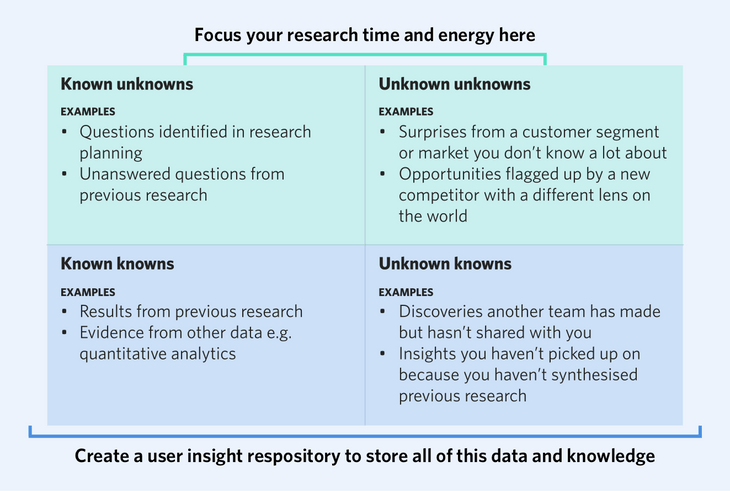Don’t research what you already know
 Peter ParkesCo-founder
Peter ParkesCo-founder
Why do you do user research or customer research? To help you design and make better products or services. Research is in the service of that greater goal, not an end in itself.
As a result, you need to find a way to do as much valuable research, as quickly as possible. And you don’t want to waste time or energy researching what you already know.
How to spend your research time

Looking at the diagram above, you want to focus your research as much as possible on the top half, and spend as little time as possible (preferably none) researching the bottom half.
This isn’t as straightforward as you might think, as it’s often difficult to tell whether or not you actually know whether or not you know something.
How to avoid wasting time
1 Start by looking inside rather than out
Put in place a system (a user insight repository) to:
- help catalog your existing knowledge (known knowns)
- make sure you pick up on things your colleagues discover (preventing unknown knowns)
2 Prioritise your known unknowns
The Lean Startup methodology has a lot to say about this – focus on your biggest, scariest risks and assumptions first – nothing else matters until you’ve resolved these.
How does this translate into research planning? Start by looking at the areas you know least about that correspond to the biggest areas of opportunity or risk to the project you’re working on, or the decisions you’re going to make as a result. Only deal with the ones where you genuinely know very little.
3 Always be in discovery mode
Make sure you’re asking enough open ended, broad questions to probe the unknown unknowns in every single research session. You don’t have to spend a lot of time on these but they’re your defence mechanism: keep an eye open for entirely new information at every stage of the process.
By following these three practises you can sharpen your research focus, spending more time on high impact work, and make the process more enjoyable. After all, who likes researching what they already know?